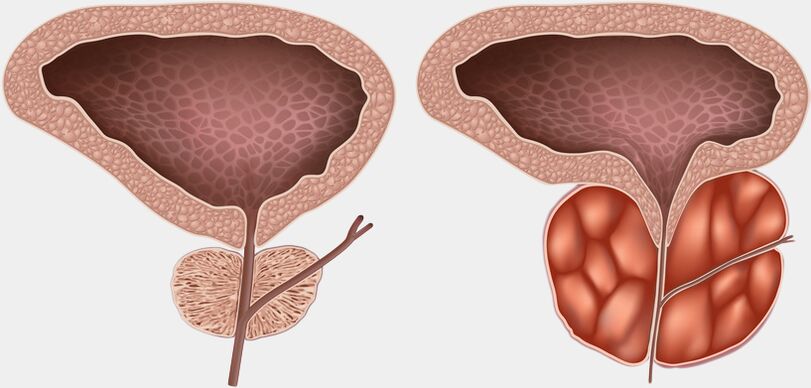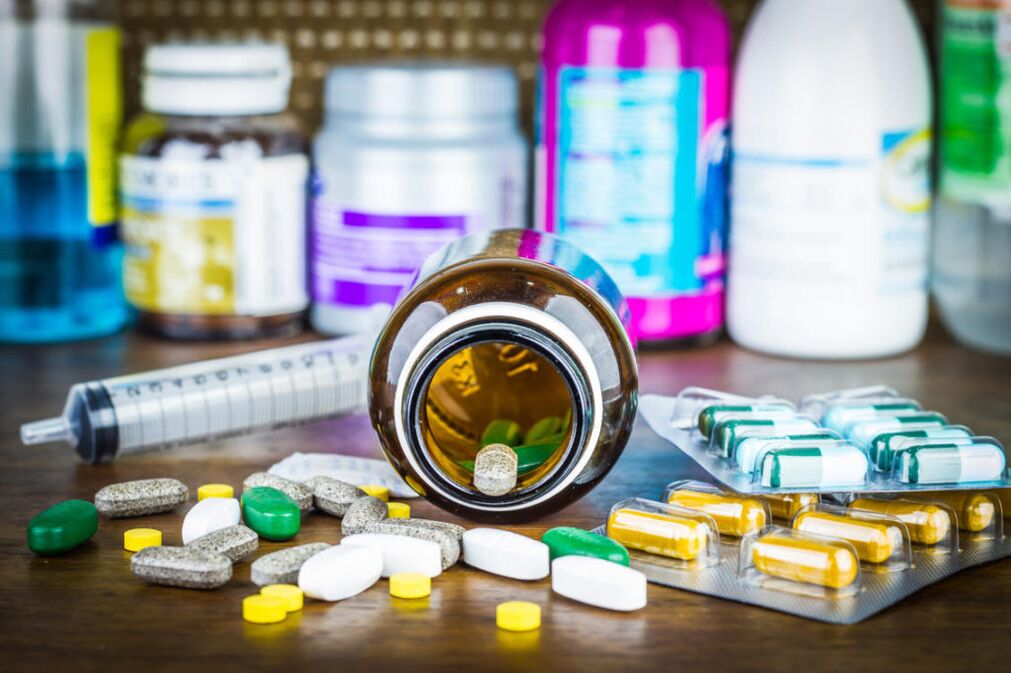Drug therapy is most often prescribed in the treatment of prostatitis. During its passage, the patient must take various categories of drugs. The goal of some is to eliminate symptoms that cause discomfort, while others deliberately act directly on the affected gland, eliminating the most important thing - the root cause. At the same time, the drugs differ in the strength of their effect, as some are against acute and others against chronic. Let's look at the most popular drugs used in the treatment of prostatitis.

Types of prostatitis medications
All medicines prescribed by the attending physician can be divided into several categories according to the method of application:
- Tablets and capsules- when taken orally, it is moderately absorbed in the body, in the case of capsules, the absorption takes place much faster, as all components reach their destination within a short time after the gelatin shell dissolves.
- Injections- these can be liquid and powder preparations, which are further diluted in a working fluid, usually anesthetic, administered intramuscularly or intravenously, and the effect is felt after a few minutes.
- Rectal suppositories (candles)- they have anti-inflammatory, antibacterial and pain-relieving effects, they are injected into the rectum of the patient lying on his side, and he must spend about half an hour in this position for the medicine to completely dissolve and be absorbed.
- Instillations- a group of drugs that exerts their maximum positive effect only when they enter the area of the affected prostate directly, the method is used in a hospital, as the introduction is through the urethra.
- Microclysters- this usually includes non-pharmaceutical drugs such as herbal teas, they cannot replace drug therapy, but can be a good way to eliminate or prevent pain.
It is worth noting that certain types of drugs can be sold in several forms at the same time, for example, tablets and suppositories, so the attending physician must definitely indicate this feature.

The most popular drugs for the treatment of prostatitis
Drug treatment of prostatitis is a rather complicated procedure that requires the doctor to choose the right drugs that not only relieve pain and eliminate other symptoms with manifestations, but also help to eliminate the root cause of the disease. The disease itself can have different origins, it can manifest itself in an acute or chronic form, and it causes all sorts of inconveniences to the patient, limiting him in terms of nature and can even lead to complete infertility.
Classic tablets, intramuscular injections and rectal suppositories can be used in the treatment of prostatitis. The choice of the drug directly depends on whether it is urgently necessary to deliver its components to the affected organ.
Do not self-medicate! The main medication is prescribed exclusively by the attending physician.
Additional funds
Treatment of prostatitis is not limited to one drug. Specialists can also use other types of drugs from different categories.
Fluoroquinolones
Fluoroquinolones are antibacterial drugs used to treat prostatitis caused by tuberculosis. These funds are used in a complex, and the patient can prescribe a course of four or more drugs at once.
Cephalosporins
Cephalosporins are antimicrobials designed to fight certain types of bacteria.
Such drugs can have a wide and directed spectrum of action, and the need to use a particular drug directly depends on the form of the disease and the cause of its occurrence.
Macrolides
Macrolides are rarely used to treat prostatitis because they are used to fight certain types of bacteria, such as mycoplasma and chlamydia. By the way, a disease like chlamydia is often accompanied by inflammation of the prostate, so doctors prescribe several tests at once to identify problems with the prostate gland at an early stage.
In case of acute manifestations of prostatitis, the attending physician may prescribe several different categories of medication at the same time. This approach allows for effective treatment of both the symptoms and the disease.
Pain relievers
The vast majority of painkillers are prescribed in the presence of acute pain syndrome, which is an organic accompaniment of chronic, but more often acute, forms of prostatitis. The use of drugs belonging to this group outside the framework of drug therapy aimed at eliminating the disease is strictly not recommended, as the body quickly gets used to them, and to achieve the pain-relieving effect, a dose increase will be required, which can adversely affect the liver and kidneys. The course of painkillers is prescribed individually.
Alpha blockers and muscle relaxants
The main task of these drug groups is to relieve the tension of the spasmodic muscles of the bladder and urethra, as well as to reduce the pressure in the pelvic area. These remedies help to get rid of the discomfort and normalize urination processes.
Immunomodulators
Such drugs basically contain natural ingredients, in the case of prostatitis - extracts based on the tissues of the prostate gland of cattle. Regardless of the drug, they all have a common principle of action that allows:
- slows down the course of inflammatory processes;
- increases the tone of smooth muscles and bladder walls;
- minimizes the possibility of blood clot formation;
- improves blood circulation in the prostate area;
- reduces the size of the prostate.
Immunomodulators can be used in many diseases, including chronic prostatitis, acute non-infectious prostatitis, prostate adenoma.
In addition, such funds are actively used for preventive purposes, which helps to avoid the development or relapse of the disease.
Vitamins and biological supplements
Devices in these categories can reduce inflammation, improve fluid drainage, and relieve congestion. The need for such drugs also arises from the insufficient intake of beneficial nutrients in the body, especially in the treatment of antibiotics.
Prostatitis is a rather complex disease, the treatment of which can only be dealt with by a real specialist. Self-selection of drugs is strictly not recommended, since with this approach there is a high probability of complications in the form of infertility, impotence, and even increases the risk of developing cancer. The use of anti-prostatitis drugs without consulting a doctor can lead to the fact that it is impossible to get rid of the disease without surgery. In addition, self-treatment is complicated by the impossibility of making an accurate diagnosis, as this requires appropriate equipment and knowledge.
It should also be remembered that most of the drugs used to treat prostatitis are quite toxic, and some types are simply incompatible. If you feel pain in the pelvic area during urination, defecation or ejaculation, you go to the toilet often, and you cannot empty your bladder normally, it is not worth taking the risk - consult a doctor. In this way, you can not only prevent the unfavorable course of the disease, but also avoid the development of its chronic form, which you will have to live with for the rest of your life. In addition, her sexual function does not deteriorate, and with timely treatment she can give birth to completely normal and healthy offspring.





























